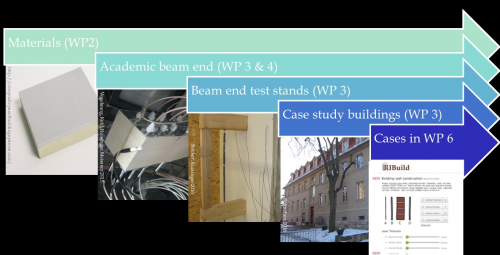

RIBuild will strengthen the knowledge on how and under what conditions internal thermal insulation is to be implemented in historic buildings, without compromising their architectural and cultural values, with an acceptable safety level against deterioration and collapse of heavy external wall structures. The general objective of RIBuild is to develop effective, comprehensive decision guidelines to optimise the design and implementation of internal thermal insulation in historic buildings across the EU. RIBuild focuses on heavy external walls made of stone, brick and timber framing, as most historic buildings are made of these materials. The project includes ten research institutions and companies from Denmark, Sweden, Latvia, Germany, Belgium, Italy and Switzerland and has been running since 2015. Hence, RIBuild covers diverse climates and building traditions which will result in guidelines applicable to historic buildings all over Europe. Anybody with an interest in building physics, retrofitting or energy efficient restoration can benefit from the guidelines.
The work plan of RIBuild consists of eight interrelated work packages each including a number of deliverables and milestones. WP0 Basic management framework WP1 Examine common historic building structural elements, determine their physical properties, classify them by different types, observe and describe main historic building envelope deterioration symptoms and study their possible causes. WP2 Provide data for material properties and threshold values for historic building materials and existing insulation materials as a background for material characterisation models and guidelines for safe renovation measures. WP3 Support the research with high quality measurement data from both laboratory experiments on components and on-site monitoring of test buildings WP4 Develop an efficient strategy for the probabilistic hygrothermal assessment of internal solutions WP5 Develop a probabilistic assessment methodology of the environmental impact and costs/benefits of internal insulation solutions, based on Life Cycle Impact Assessment (LCA), Life Cycle Cost (LCC) and Cost-Optimal (CO) analysis. WP6 Develop and to assess the methodology for a deep renovation of historic buildings, based on the methodologies developed in WP4 and WP5. WP7 Coordinate the overall communication of RIBuild. A project communication plan will be drafted and executed. Project communication activities will be monitored. Furthermore, will hold track of the dissemination activities of RIBuild.
The focus of TUD was mainly set on WP3, which aimed to support the research with high quality measurement data from both laboratory experiments on components and on-site monitoring of test buildings. These results were summarized in two reports: D3.1: "Closed Technology Loop of Laboratory Experiments and Simulation Models in the Field of Internal Insulation Testing" and D3.2: "Monitoring Data Basis of European Case Studies for Sound Performance Evaluation of Internal Insulation Systems Under Different Realistic Boundary Conditions". Both reports contributed furthermore to the final report, the written guideline: D6.2: "Written guidelines for decision making concerning the possible use of internal insulation in historic buildings". All reports and the web tool are available on the project website: https://www.ribuild.eu/.